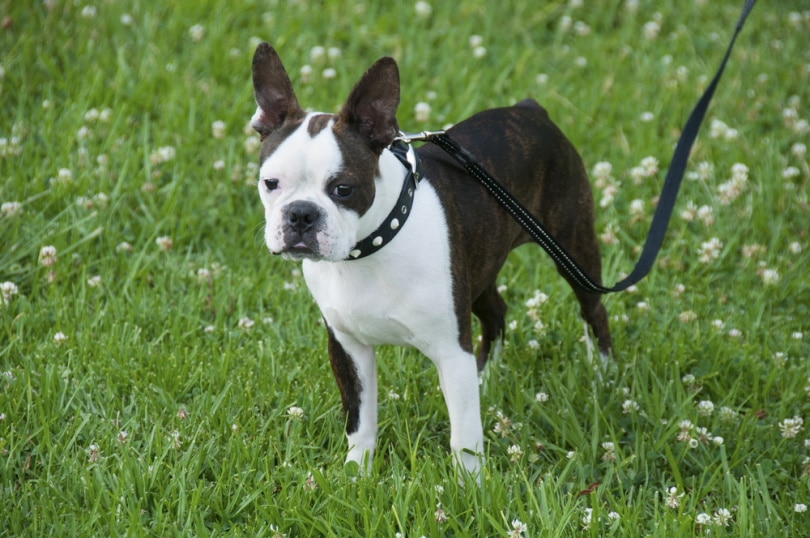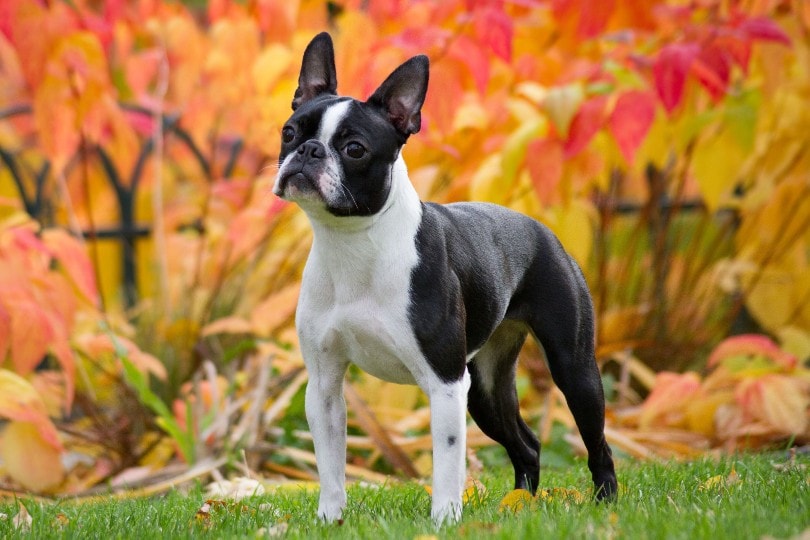- July 3, 2023
Does a Boston Terrier Have a Tail? Breed Interesting Facts


Hailing from Boston, Massachusetts, the Boston Terrier is a small, cute dog breed that is known for its intelligence and loyalty. Strutting around with a tuxedo-like coat and an adorable short muzzle, these dogs are beloved and they know it. One thing a lot of people ask about these dogs is, does a Boston Terrier have a tail? The answer to this question is yes, Boston Terriers are born with tails. They are very short and come in varying types. In some cases, breeders even cut or dock puppies’ tails before they leave for their forever home. Continue reading to learn why Boston Terriers often have their tails cut before they leave for their forever homes and what this can mean for these little dogs along with more information about this amazing breed.

A Quick History of Boston Terriers
It’s hard to believe that Boston Terriers were originally bred as fighting dogs. Yes, like so many popular breeds that are now sought-after for companionship, these little dogs came about in the late 1800s. Breeders wanted a dog that was strong and could be intimidating. They also wanted the dogs to be loyal and friendly. This breed grew from crossbreeding various mixed breeds, with the English White Terrier and Bulldog being its prominent ancestors. Called “Bull Terriers” and “Round-Heads” originally, these dogs were beloved in the Boston area. They were so popular in fact, they were often referred to as “Boston Bulls” until they received their formal name in the 1900s.


Does a Boston Terrier Have a Tail?
Now that you’ve learned a bit about these little dogs, let’s talk more about their tails. Yes, Boston Terriers are born with tails. Their tails are normally very short, which is the AKC breed standard. You’ll even find that there are varying types of tails for these dogs. Let’s take a look at those types so you can better understand them.
Bobbed Tail
This tail type is the most common found in Boston Terriers. A bobbed tail resembles a cotton ball on the spot where the tail should go. These tail types are stubs and the main reason why so many people think Boston Terriers are born without a tail. This tail type is one of those accepted by the AKC.
Corkscrew or Curled
One of the standards the AKC accepts is the corkscrew tail. This tail type is around 2 to 3 inches long and shaped like a corkscrew. The tails can be less curled. Unfortunately, this tail variation is considered a deformity in the breed. A corkscrew tail often indicates deformed vertebrae in the spine. If your Boston Terrier has this type of tail you should head to the veterinarian for a visit. They will let you know whether surgical intervention is needed.

Straight Tail
This tail type is considered the rarest one. Typically, these tails point straight down, are only an inch or 2 long, and are set low on the rear. When it comes to AKC breed standards, the straight tail must be below the horizontal. While this type of tail is rare, it is also the one that has fewer tail-related issues.
Crooked Tail
Crooked tails are quite similar to corkscrew tails. This type of tail is often an indication of a spine deformity and requires the pet to visit the veterinarian for an examination. Instead of the corkscrew appearance, this tail type is the same length but will show bends in one or more places.
Gay Tail
Gay tails typically point straight up on a Boston Terrier. While these types of tails aren’t accepted by the AKC due to how high they sit on the body, people think these tails are cute. The name comes from the happy appearance the tail gives the Boston Terrier as they bound around.

Tail Docking
We mentioned above that some breeders cut or dock the tails of Boston Terriers before they sell them. Why does this happen? The answer is simple. A Boston Terrier can be born with a longer tail than the ones listed above. When this happens, it often causes people to doubt whether the dog is full-blooded. The truth is, full-blooded Boston Terriers can have long tails. It’s possible. However, breeders want their animals to fit the typical appearance of these animals. Instead of finding a home where the owners aren’t concerned with the long tail, they dock them or cut them before the puppy is shown for buying.

Is Tail Docking Dangerous?
There are lots of people out there who prefer having their dog’s tail docked due to how it looks. However, there are states in the United States that have banned this practice and many veterinarians feel this process is painful, cosmetic, and unnecessary. It can cause other issues too. Not only is the pain level not fully understood, but the possibility of depression, infections,lethargy, neuromas, and chronic pain afterward are significant. Your dog even suffers to communicate through tail wagging.
More About Boston Terriers
Beyond the adorable factor, there’s a lot to love about these amazing dogs. Boston Terriers are considered a highly intelligent dog breed. They also have one of the best personalities in the dog world. Boston Terriers adore their families and can get along well with children and even other animals. You can easily care for these dogs in a large home with a backyard where they can play or in a small apartment where they are taken on walks and visits to the dog park. This shows these dogs are quite adaptable and simply want to be with their families.
Boston Terriers are easy to train considering their high level of intelligence. You’ll need consistency and a bit of patience during this process, but no worries. These little dogs are easy to please and will try their best to make you happy. Don’t forget, however, that Boston Terriers need mental stimulation. This includes training, playtime, and exercise. This will help detour boredom and issues with barking.

Final Thoughts
While Boston Terriers typically have small tails, they do have them. They even have varying types of tails. The important thing to remember when it comes to the tails of these little dogs is that in some cases, their tails can indicate spinal issues. Proper health checks with the veterinarian will help you stay on top of those issues or other potential future problems.
Featured Image Credit: Zero Degrees Photography, Shutterstock
Tags
What do you think?
Related Articles

New Puppy Checklist: Gear You’ll Need for Your New Dog
Getting a new puppy is really exciting, but before you welcome them home, it’s important to prepare your space for them. Since puppies need a

How Big Do Mini Poodles Get? Vet Reviewed Average Weight & Growth Chart – Dogster
The information is current and up-to-date in accordance with the latest veterinarian research. Learn more » When you buy a Miniature Poodle, you might not

Can Police Dogs Smell Nicotine? Vet Verified Facts & Info – Dogster
The information is current and up-to-date in accordance with the latest veterinarian research. Learn more » While cigarette sales have been declining steadily for decades,

How Old Is 5 in Dog Years? Vet-Approved Guide to Each Size of Dog – Dogster
The information is current and up-to-date in accordance with the latest veterinarian research. Learn more » A common method for calculating a dog’s age is

